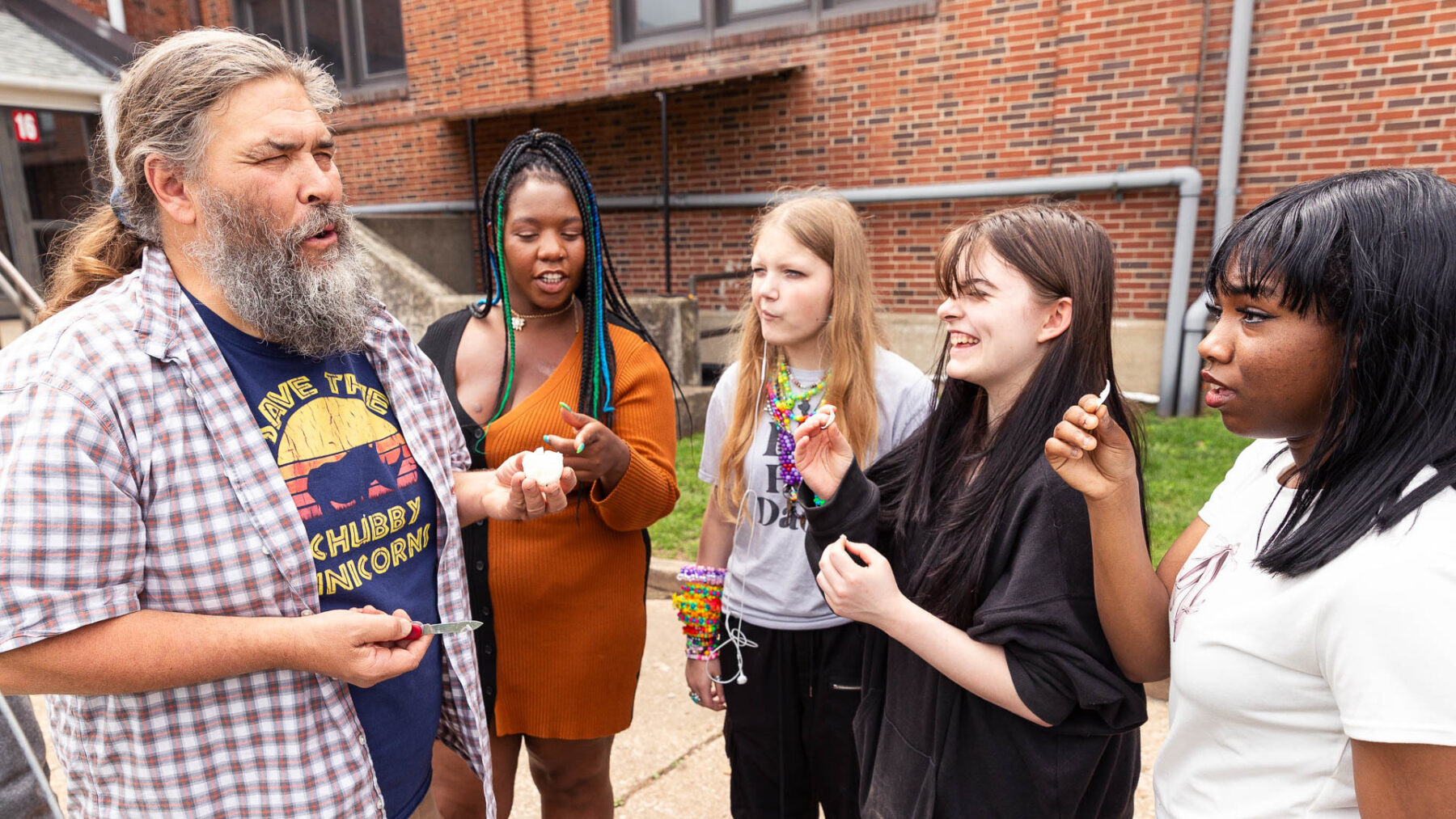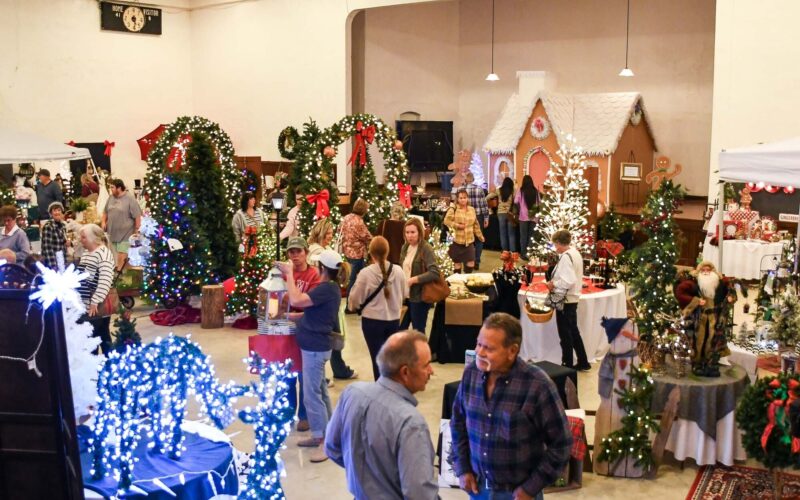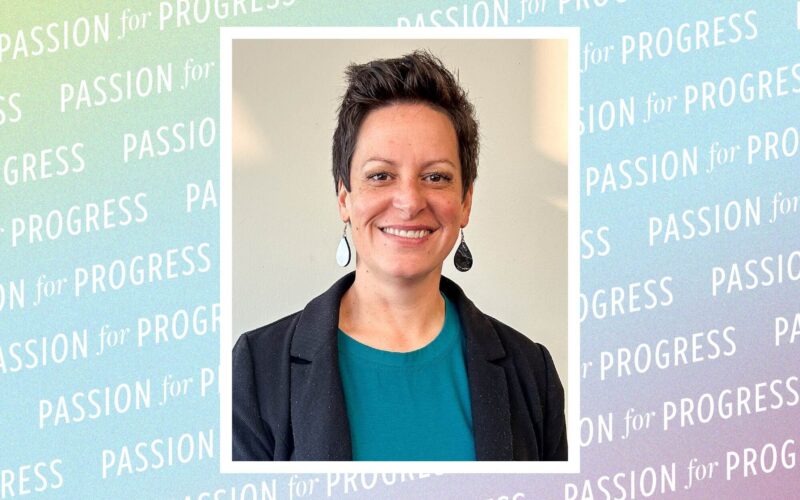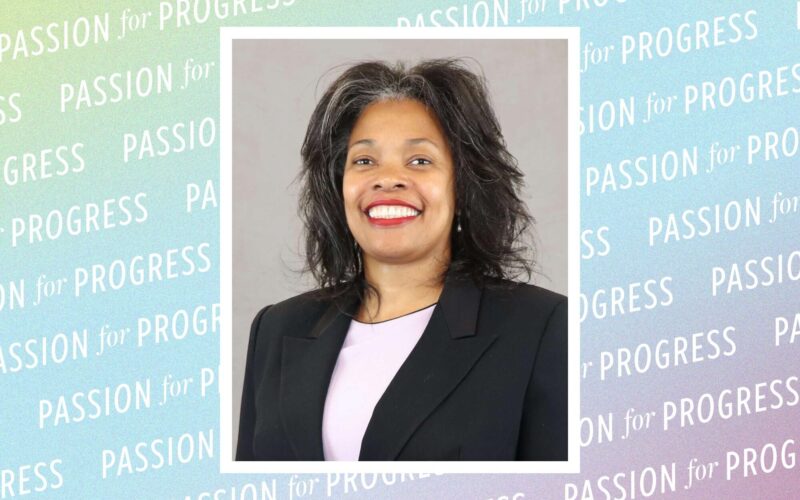Passion & Purpose: Summer 2024
Grant-supported urban farming program shows Springfield youth new ways to think about their dinner
For me, it was over the first time I had a carrot straight from the ground,” said Mia Jones with a laugh. “I couldn’t believe that I had grown something that tasted so incredible and rich!” We were standing in the grounds of Central High School in Springfield, nearing the end of a tour of the campus’s green places and gardening projects. It was the second to last week of classes and we’d been visiting a group of science students who are part of United Community Change’s BLACC Ag Academy, funded in part by a $30,000 Jewell Schweitzer Collective Impact Grant.
Jones is executive director of United Community Change, an ambitious, multifaceted organization dedicated to empowering underserved and marginalized communities. As the organization grows, it seeks — among other things — to connect folks from these communities to safe housing and gainful employment, to educate youth and adults alike on civic engagement and to promote healthier and more equitable food access. According to Jones, who also owns Soul Fresh Farms, these are the essential elements of empowering an individual. “You need shelter and income, and community is so important to having a support system,” she said. “And how we grow food is something that community is built around.”
On that day in mid-May, Paul Epps, science teacher and BLACC (BIPOC Leaders Achieving Community Change) Ag Academy’s liaison at Central, led a group of about 20 students through the grounds as part of UCC’s program (and, it must be said, in an attempt to recruit students to Central High’s gardening club, the Botanical Society — by the end, it seemed he’d convinced at least a couple of them). The lecture began with Epps asking his students what they’d eaten for dinner the previous evening and which vegetables comprised those meals. The question is essential to a larger educational project of urban farming: where does your food come from? How is your quality of life impacted by what foods you have access to?

Paul Epps, science teacher at Central High School, and Mia Jones, executive director for United Community Change, convince students to try green garlic, pulled moments earlier from the school’s gardens in Springfield.
Urban farming is an increasingly popular tool for not only growing locally and ethically sourced food, but also for creating social bonds, sharing knowledge and building community. On one hand, urban farms can provide healthy greens through regenerative growing practices in areas dominated by fast food and produce-less convenience stores (so-called food deserts), but perhaps their deeper and more lasting value is in demonstrating to residents an avenue to achieve self-sustainability through cooperation.
As they expand and become more intertwined with the communities they serve, these farms can offer economic opportunity for the farmers selling the produce. They are sites of education and skill-building. The green spaces they create can beautify a community and improve air quality. By positioning food growth closer to the consumers of the food, urban farms can help prepare communities for situations involving national supply chains, which are predicted to become increasingly vulnerable to natural disasters, fuel shortages and the like.
For Jones, creating a small urban farm offered a way to turn idealized activism into tangible community change. After spending time with various nationwide political movements, including Black Lives Matter, she realized she wanted to focus her community-building ideas to a more local level. Shortly after moving into a Springfield neighborhood, Jones found a neglected community garden near her home and took it upon herself to recultivate it.
The life-changing power of a community garden really became apparent to Jones after her brother was released from prison and needed a space to reacclimate to society and to a new understanding of himself. “I put him to work in the garden, which ended up being a kind of mental therapy for him,” she said. “It really was inspiring to see him pivot into a life change and become a new and more confident person. He was like my case study to confirm how much of an impact all this can have on a life.” Jones’ brother now serves as a site manager at a local community garden.
Sydney Hampton, a student at Central High School in Springfield, shows off a freshly picked strawberry. She was among the students touring urban farms in Springfield as part of United Community Change’s BLACC Ag Academy.
In addition to the community-building aspects of urban gardening, the BLACC Ag Academy also aspires to get younger folks interested in food in general, to think about where their food comes from and how it gets to their tables. CHS sophomore Sydney Hampton, who was present on our visit to the school and who’s been part of the program since January, said that she hadn’t considered that growing one’s own food was an option. “Mia’s taken us on a bunch of field trips; I like learning about everything that grows in these little local farms.”
Carl Tamm, another sophomore in Epps’ class, loves “meeting people who are passionate about farming; Farmer Dan is my personal hero,” referring to Dan Bigbee, co-owner of Fassnight Creek Farm, a popular Springfield urban farm, as well as a partner and frequent field trip stop of the BLACC Ag Academy.
Working with community partners isn’t just a part of UCC’s vision; it’s also an essential criterion of the Jewell Schweitzer Collective Impact Grant program. The program’s purpose is to support innovative and collaborative solutions to what Springfield-Greene County’s Community Focus Report designates as Red Flag issues. The BLACC Ag Academy is ready-made for such support: the program exists with the partnership of the U.S. Department of Agriculture, Hamra Enterprises, MU Extension, CHS and, of course, several local farms. The Red Flag issues the program addresses are those around community health and civic engagement among young people.
During the outing, Epps showed off everything growing in the CHS gardens, from green garlic growing underground to the young peaches still ripening in the trees. He pointed out that members of the faculty can enroll in a community-supported agriculture program with the Botanical Society to receive a quantity of garden-fresh veggies every week. Whatever’s left, he explained, is free to whoever wants to pick it from the garden.
A student asked Epps whether any of the garden’s produce ends up in the school cafeteria. “Not yet, but we’re hoping to change that as we grow,” he answered.
Jones agreed: “That’s a major goal of the program, to get the kids eating local food in the school.”
As Paul Epps brought us to the end of our tour, it was evident that the seeds of such a vision were already sprouting. By empowering a future generation of community stewards, and with the leadership of Mia Jones and its passionate partner organizations, BLACC Ag Academy is creating a healthier and more connected community for all of us.
By Matthew Stewart · This essay is featured in the summer 2024 edition of Passion & Purpose: The CFO Magazine.



